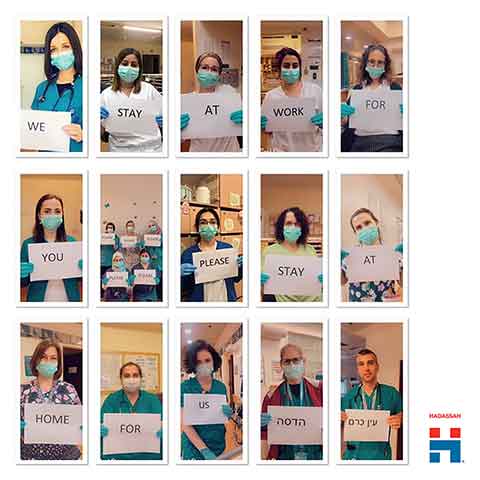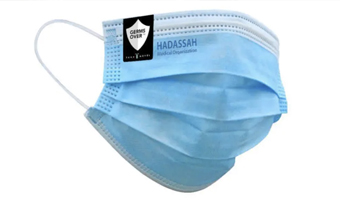
With a little distance from the first phase of the COVID-19 pandemic, Hadassah Medical Organization nurse educator and critical care specialist Julie Benbenishty is now analyzing and documenting what Hadassah did right and what she and her colleagues can do differently going forward to fortify the nursing staff and enhance the quality of care for COVID-19 patients.
In a June 23 Hadassah International webinar, moderated by HI Latin America Project Manager Jeanne Vachon, entitled “Hadassah Nurses: From Bedside Care to International and National Research,” Benbenishty, who worked daily in a COVID-19 Intensive Care Unit (ICU), reported that “a majority of our patients in the intensive care unit did recover.” And, she said, the nurses felt taken care of by the hospital administration, with COVID-19 testing provided for them every five days.
At the same time, she discussed the challenges she and other critical care nurses faced in treating COVID-19 patients, “who are like no other patients before.” As she explained, everything “was a mystery” in terms of this disease.
“The most needed resource,” she emphasized, “was not equipment or the physical space to isolate and treat COVID-19 patients. It was staff who have the specific competencies to care for them.” As she explained, many nurses from other departments came to work in the COVID-19 ICUs. But these nurses did not have the specialized training required. Looking to the future as Israel braces for more outbreaks, she elicited a commitment from the Israeli government to initiate post-graduate ICU courses for nurses. In addition, Hadassah is preparing to provide “mini-competency” courses for its nurses. Benbenishty noted also that perhaps they will consider bringing ICU nurses to Hadassah from other parts of the country where COVID-19 does not have a foothold.
In one of the many studies she has initiated, Benbenishty is investigating the relationship between quality of care in the COVID-19 ICUs and the training the units’ nurses have in critical care.
Benbenishty is also collaborating with colleagues in Israel and Europe to study the pressures that ICU nurses were under as they cared for COVID-19 patients. She and other nurses in European countries are looking at the dissonance health care workers face as, on the one hand, they are admired for their dedication to the COVID-19 patients, while, on the other hand, they are met with social rejection and social isolation because many people are fearful of contracting the virus from them. Benbenishty pointed out that some individuals have irrational fears as to how likely health care workers are to infect them. As she explained, “We have personal protective equipment that shields us from contracting the coronavirus at work.”
Hadassah nurses, Benbenishty reported, are in regular contact with their colleagues around the world. Sometimes speaking with one another several times a day, they keep up with protocols and policies proven effective in each other’s hospitals. To ensure that their Palestinian neighbors beneift from their discoveries, Hadassah’s nurses have been sharing their innovative protocols and guidelines with the Palestinians. When the policies are written up in Hebrew, Benbenishty immediately translates them into English and sends them to the Palestinians, who then translate them into Arabic.
How do nurses maintain their morale as they persevere in their intense daily challenge of caring for COVID-19 patients? “Nurses are their own support group,” Benbenishty explained. “We are all very close.”
Keeping up the morale of patients is also a challenge. Benbenishty is proud that Hadassah modified its policy of not allowing family to visit COVID-19 patients in the ICU to enable family members of dying patients to suit up with personal protective equipment and enter the ICU. “At Hadassah, no one has to die alone,” Benbenishty said. She added, “Everyone needs closure.”
Benbenishty reported that Hadassah conducted a study of the drug Actemara in her COVID-19 ICU. Actemara is given to COVID-19 patients in respiratory distress to block the virus from going into the lungs and creating the cytokine storm that often leads to death. The study involved 20 patients, but as the number of Hadassah’s COVID-19 cases declined, Hadassah began collaborating with other medical institutions to combine data and expand the number of patients in the sample to achieve more meaningful results. The researchers are also examining the genetic makeup of these COVID-19 patients who went into respiratory distress.
This webinar is part of the Hadasah International Summer Summit 2020 “Health Talks with Hadassah Experts.” To view the full program and register for any of the webinars: https://hadassah-global-response.org/hadassah-international-summer-summit-2020-health-talks-with-hadassah-experts/









